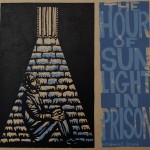Conscientization, ‘Light Bulb’ Moments and Prison Abolition…
People always ask me how/when I came to be so passionate about ending incarceration. I usually respond that my process of conscientization was a gradual one. It was through a million small and large experiences that I came to prison abolition.“It is the job of thinking people not to be on the side of the executioners.”
― Albert Camus
Michelle Alexander, author of the New Jim Crow, often tells a ‘light-bulb’ moment story when she gives talks. She interviewed a young black man who was sharing a story of being harassed and framed by the police. He seemed to be a perfect candidate to join her ACLU class action lawsuit until he shared that he had been arrested in his past. At that point, Alexander tells her audience that she had to send him away because they could not take the chance that his credibility might be impugned as a witness because of his previous criminal record. She usually ends by saying that she has since learned that the majority of young black men in the community that she was working in find themselves caught in the net of the criminal legal system. I haven’t done her anecdote justice so you should listen to her tell it instead (it starts at 10:00).
As I said earlier, I have no eureka moment to share about when I first became aware of the ravages of mass incarceration and the futility of prisons. I was young when I first had to decide whether I would rely on the criminal legal system as the vehicle for seeking accountability for the harm that I had experienced. Instinctively, I recoiled. I had experienced the trial of a good friend’s killer and I wanted no part of that for myself. Since I wasn’t going to pursue criminal legal sanctions, I was left with no other alternatives. All I had at the time were my anger, fear, and self-destructive tendencies.
It was perhaps during that period that I began to yearn for another way — for some alternative to punishment and retribution. I’ve written before about my earliest encounter with the concept of restorative justice through experiencing the reaction of a mother towards the person who had killed her son (my friend). I didn’t become a proponent or practitioner of restorative/transformative justice then but it must have left an imprint.
While I have never been incarcerated, I have spent hours visiting, writing, and connecting with people on the inside. In a strange way, I was lucky to be exposed to the humanity of prisoners through one of my favorite students who did a bad thing that landed him behind bars for several years. I say that I was “lucky” because I already knew who he was before he was locked up. I knew him to be funny, kind, insecure, quick to anger, infuriating, you know… I knew him to be human. He was my initial link to prison and perhaps that allowed me to be able to see all of the others who were imprisoned with him as human beings too. This quote by James Baldwin (one of my favorite writers and thinkers) expresses my own philosophy: “People who treat other people as less than human must not be surprised when the bread they have cast on the waters comes floating back to them, poisoned.” Our unwillingness to see prisoners as human beings harms us as much as it does them. The understanding that we are all connected makes it so much easier to demonstrate compassion for others and ourselves. That’s been my greatest lesson so far and I could not have learned it without the gift of having met and knowing people who have been deprived of their freedom. And so the realization for me that prisons must be dismantled has come slowly and has washed over me almost without my knowing it. But here I am today – a prison abolitionist. And I have to wonder: what took so long?

